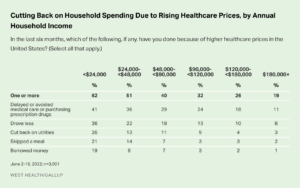The ramifications of President Joe Biden’s economic policies continue to ripple out and while his administration touts small measures to provide “breathing room,” there are serious concerns that some families already struggling will be facing greater food scarcity.
Feeding America began in 1979 and is considered the nation’s largest domestic hunger-relief charity and its president and Chief Operating Officer Katie Fitzgerald recently spoke with Fox News Digital to address how inflation is creating more issues in the supply chain than the COVID lockdowns had. In fact, she lamented that normally readily available goods like Turkeys ahead of the holidays are already difficult to procure and many will miss out this Thanksgiving.
“The crisis that we’re seeing right now is, in our judgment, in some ways worse than what we saw at the height of the pandemic,” Fitzgerald told Fox News Digital. “We don’t see the root causes in terms of food insecurity [being] the same as when the economy essentially was shut down…that was more driven by people losing their income.”
Instead, she explained, “it’s simply that people are having to make economic tradeoffs. And what they’re having to cut is their food, when everything’s so much more expensive.”
As previously reported, the nonprofit group of organizations West Health commissioned a survey by Gallup that found among the lowest income earners, 62 percent were taking multiple steps to combat inflation that included skipping meals and postponing medical care. Dan Witters, a senior researcher at Gallup stated, “Inflation is hollowing out consumer spending habits across an array of areas. What is found just under the surface is that after gas and groceries, the role of inflation in reducing the pursuit of needed care is large and significant. And the rising cost of care itself, which is originating from an already elevated level, is having an outsized impact on lessening other forms of spending, compounding the problem.”
 (Image: West Health)
(Image: West Health)
“The reason it’s worse in some ways, in our point of view is that the corollary supports that helped us get through the surge in food insecurity during the pandemic are really not available to us. And the food banks are dealing with this inflation,” Fitzgerald went on as consumers face 40-year high inflation.
The COO outlined some of the help that the government had provided during the height of the pandemic through the coronavirus food assistance program (CFAP) and Emergency Food Assistance program run by the USDA that helped keep the pantries full despite high levels of food insecurity. Now with those programs gone and with rising inflation, supplies have dropped by as much as 30 percent.
“We’re very worried that if we don’t start to get relief in terms of the increased price of food and other costs in this country, it’s going to be a very difficult fall and winter and holiday season,” Fitzgerald explained as she added, “turkeys are just cost-prohibitive now.”
“They’re already trying to source those products in anticipation of Thanksgiving and having a great difficulty in doing that right now,” she expressed before noting, “So they might have to give some people chickens this year–they might not be able to give out other things.”
In addition to the lack of commodity food sourced from the government, Fitzgerald explained other problems facing the food banks stem from donations being down, “because of the ongoing tightness in inventory and the ongoing supply chain challenges,” and “food banks have been essentially purchasing their way through this problem. And the value of their dollar is just as challenged for you and I when we go to the grocery store.”
The only avenue that has remained consistent for them to stock their food banks has been in partnering with retailers that account for some of the reported 66 billion pounds of food a year that go to waste.
“We have relationships with retailers across the country. Our food banks, our food pantries, pick up their surplus food from local Walmarts, Krogers, Stop & Shops, you name,” she explained.
Ultimately, she concluded, the rising costs and devaluation of the dollars already available were the leading factors hampering their operation, and therefore financial help would be the best way to support them at this time.
DONATE TO BIZPAC REVIEW
Please help us! If you are fed up with letting radical big tech execs, phony fact-checkers, tyrannical liberals and a lying mainstream media have unprecedented power over your news please consider making a donation to BPR to help us fight them. Now is the time. Truth has never been more critical!
Comment
We have no tolerance for comments containing violence, racism, profanity, vulgarity, doxing, or discourteous behavior. If a comment is spam, instead of replying to it please click the ∨ icon below and to the right of that comment. Thank you for partnering with us to maintain fruitful conversation.

